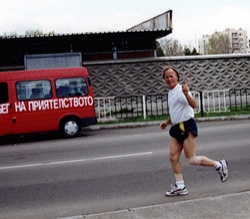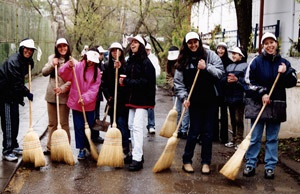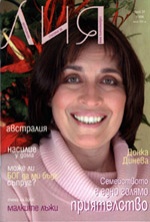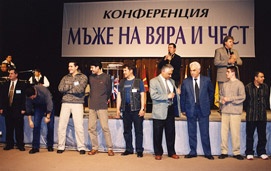|
|
The Early Years of Revival
Growing up in Communist Bulgaria was an experience. With all that was going on, it was extraordinary to witness the change of a political regime that we once thought would last forever. Bulgaria was not spared the winds of change that were blowing in Eastern Europe in the late 1980s and early 1990s. God showed mercy and goodness to Bulgaria when he didn’t allow any major bloodshed to take place. The evangelical churches in Bulgaria soon began enjoying freedoms that were once thought impossible.
Crusades, street evangelism, rallies at stadiums, parks and city squares were becoming the norm of regular evangelistic endeavors. Bibles were supplied, tracts printed and some churches experienced numerical growth that could be matched only with post-Pentecostal numbers from the book of Acts.
Bulgaria was on the edge of even greater revival times when the political season changed. The period of 1993-1997 brought an unsuspected threat from figures in political circles who were not happy with the rapid growth of the Bulgarian evangelicals (who were perceived as posing a certain political threat). Numerous churches were denied public access to media outlets, and restrictions of all kinds followed.
The changes in the society forced the evangelical churches to rethink and reorganize their evangelistic efforts. Churches needed to venture into areas and begin using new evangelistic approaches.
Mission Possible (MP) has been involved in Eastern Europe since 1973, smuggling Bibles and literature in and helping and assisting local pastors in different ways. The heart of Mission Possible’s ministry in Bulgaria has always been to serve and assist local churches in their ministries to individuals and society.
|
|
Leah Magazine
In 1998 MP launched Leah, a new and one of a kind magazine for women in Bulgaria. Existing publications at that time provided a good saturation of books and booklets; however, the evangelical churches and the Bulgarian society needed a publication that would target not only demographically the largest segment of the country, but also the gender group that was most active and most represented in any congregation.
Leah was launched as a response to the immediate needs of evangelical women and their church ministries. Soon after the magazine’s birth, surveys began to show that readership had grown four to six-fold. The reason for this growth was surprising. Most of its readers openly, enthusiastically and purposefully shared their copies of Leah with their non-Christian friends. Leah soon became an active tool for evangelism and for spreading the gospel.
![]()
In recent years Leah has brought a new fascination to the editorial team at Mission Possible. Some time back the office started receiving regular invitations for facilitating and organizing “ladies-night-out” events. Theses events are co-sponsored by Leah and a hosting local church, and include discussion on challenges for women today and hot topics in society. These events serve to build bridges with those who otherwise would not go through a church door.
Strengthening the Roots
In previous years, changes in the Bulgarian society and the growing mass suspicion toward the evangelical churches posed major challenges to active personal evangelism. Personal relationships, already-developed levels of trust, being part of the culture and all the other important elements of accessing neighbors, relatives and coworkers were present. The missing link was the tool.
Mission Possible wanted to provide an evangelistic tool that would effectively assist churches in their outreach efforts. MP was well aware of the growing popularity and effectiveness of the Alpha Course. Having been developed, practiced and proven to work in central London, Alpha was easy to translate and prepare for application in Bulgaria. It was a local church-based approach to evangelism and a perfect match with MP’s heart and intention of providing local churches in Bulgaria with the tools they needed to effectively reach out to their communities.
The Alpha Course is currently used by an array of churches. Combining theology and practice, Alpha brings a great blend of knowledge and life together, bridging the gaps that often are created by evangelistic efforts that only target “to tell” but avoids the more intimate levels of sharing the gospel. The results of Alpha are yet to be seen as more and more churches adopt Alpha as a tool for their evangelistic efforts.
|
|
Remembering the Past
Because of past media disinformation and representation of evangelical churches in Bulgaria, it was also imperative to provide society with accurate information concerning the history and life of the evangelical Christians in Bulgaria. Mission Possible organized a scientific conference, “The Contribution of Evangelicals to the Political and Spiritual Liberation of Bulgaria,” at the University of Sofia. The conference provided long-forgotten and intentionally-blocked data of the major role played by evangelical Christians before, during and after the events of the Russian-Turkish war. Scientists, members of the Bulgarian Academy of Science, a former prime-minister and esteemed members of the academic community were present. The presentations were published and made available for future use by evangelical churches across the country.
Crafting a Nationwide Initiative
After major changes in the political climate in 1997, Bulgaria steered to the right with a strong pro-European, pro-NATO and pro-American agenda. The turn of the new millennium brought further changes that challenged evangelical churches in Bulgaria to think of new ways to present the gospel. The time of secular, non-evangelical media portraying churches as non-Bulgarian was gone. MP launched nationwide initiatives in the spring of 2002. These local, regional and national initiatives were aimed at the same goal – providing evangelical churches with outlets for a correct and public presentation. Hope for Bulgaria, a national evangelical initiative aimed at providing a positive portrayal of the evangelical churches to the society-at-large, was born.
![]()
 Using sports to share the gospel in Bu |
Athletic Approach to Evangelism
Hope for Bulgaria’s program included an eleven-day run across Bulgaria, providing outreach meetings, concerts and press conferences in all major cities along the route. This “Run of Friendship” also set a precedent, allowing Mission Possible and local evangelical churches to hold ten consecutive press conferences along the route which stretched between the Black Sea port city Bourgas to the capital city, Sofia. In all major cities along the 350-mile route, churches across all denominations came together for evangelistic meetings and concerts, presenting a united face to society. The press conferences allowed local churches to provide a direct presentation of their history and current active involvement in respective cities. An additional effect of this initiative was an invitation to one of the top-rated evening television shows, “Slavi’s Show.” This provided evangelical churches with an opportunity that was nonexistent prior to the initiative.
Inviting the Nation to “Come and See”
The events of Hope for Bulgaria culminated in an unprecedented nationwide initiative called Open Door Days which invited individuals to visit a local evangelical church and to celebrate Palm Sunday among evangelical Christians. The Apostle Philip’s simple yet profound invitation to Nathanael to “come and see” (John 1:46) was used as the main slogan for the campaign. Mission Possible prepared the initiative in cooperation with the Bulgarian Evangelical Alliance, providing local churches with posters, invitations and opportunities for community projects. This last one proved to be extremely attractive to youth groups and young adults as it provided them with “hands-on” ministry and opened doors for one-on-one evangelism.
Conclusion
Hope for Bulgaria provided many lessons in leadership and management which allowed us to lead better evangelistic programs. Allow me to share three:
First, evangelism works best when combined with meeting a real need. Scripture gives many instances when a real human need was met while the gospel was being preached. Efforts that only preach give results, but the results are much greater when preaching is combined with caring.
Second, evangelistic efforts are best when various churches and organizations unite. The kingdom of God is much bigger than any single church and the need for evangelism and outreach are much greater than any of us can meet alone. Only when we come together in unity, passionately desiring to reach the unreached with the gospel of our Lord Jesus Christ, can we see results that will exceed our boldest expectations.
Third, the more we desire to see souls saved, the more we understand our desires are miniscule in comparison with God’s desire to rescue people and redeem them for eternity. We must move out of our comfort zones and do things that we do not feel comfortable doing. God’s heart for the lost must move us forward in compassion and passion to do what he has not stopped doing since the days of creation.
We must reach out with his hand to his beloved. It is indeed exciting to be part of such a mission as this!




